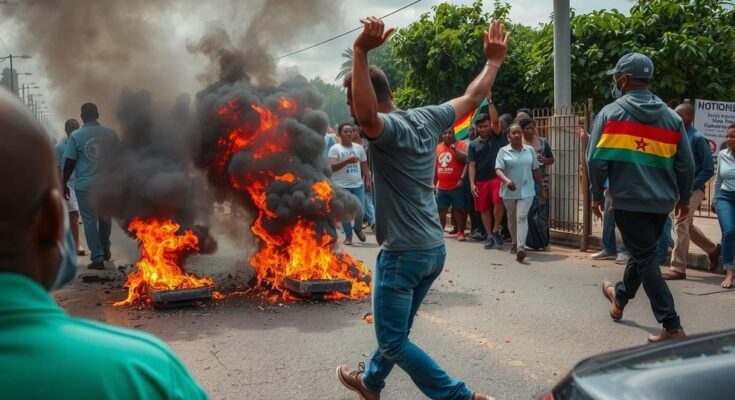Following Mozambique’s highly disputed presidential elections, over 110 individuals have died during protests against the ruling Frelimo party. The unrest began after the assassination of two opposition officials and the controversial election results. Rights groups criticize the government’s violent crackdown on demonstrations, highlighting serious human rights violations. Opposition leaders remain committed to persistent protests as tensions escalate in the country.
In the aftermath of Mozambique’s recent elections, over 110 individuals, including children, have lost their lives due to violent protests against the ruling party, Frelimo. The clashes erupted after the controversial election held on October 9, which opposition leaders claim was manipulated to ensure Frelimo’s continued dominance. Following the assassination of two opposition figures on October 18, widespread unrest has ensued across the nation, resulting in significant casualties. Rights organizations have condemned the government’s harsh response to what began as peaceful demonstrations, asserting that excessive force has been employed by security forces. International observers have also reported serious irregularities in the electoral process, raising further tensions as the opposition continues to call for nationwide protests.
The current civil unrest in Mozambique represents a significant challenge to the Frelimo party, which has governed since the country gained independence in 1975. The violent protests were ignited by the disputed presidential election results, which led to calls for accountability and justice from opposition leaders. The situation escalated after the killings of prominent opposition officials, intensifying pressures on both the government and security forces. According to reports from civil society organizations, the protest actions have included the barricading of roads and attacks on police stations, drawing international attention to the potency of grievances against the state.
Following the declaration of Daniel Chapo as the new president amid ongoing legal disputes regarding the election results, opposition parties remain determined to challenge these outcomes. While calling for unyielding public demonstrations, opposition leader Venancio Mondlane has expressed grave concerns for his safety, prompting him to leave Mozambique. He has maintained communication with supporters through social media, urging continued resistance against what he perceives as an illegitimate government. On multiple occasions, concerns regarding human rights violations have been raised, especially following the documented instances of brutal military action against protestors.
“If the regime still wants to maintain the election results, if the fraudsters want to maintain the idea of establishing another illegal, illegitimate and unelected government, we will have no alternative,” stated opposition leader Venancio Mondlane, emphasizing his resolve to resist the current political climate.
As Mozambique continues to grapple with profound political turmoil, the role of civil society organizations and international observers will be crucial in advocating for human rights and holding authorities accountable. The need for dialogue and credible investigations into the violent incidents will become increasingly vital as the nation seeks to emerge from this cycle of violence and unrest.
In conclusion, the ongoing protests in Mozambique underscore the deep-seated grievances among the populace concerning the election process and the government’s response to dissent. Human rights organizations have raised alarms over the excessive use of force by security agencies, presenting a dire need for reforms. As the opposition pledges to sustain their resistance, the international community must remain vigilant in monitoring the situation to foster peace and stability in the region.
The protests in Mozambique are rooted in allegations of electoral fraud following the October 9 presidential elections. The ruling Frelimo party has maintained power since independence in 1975, leading to growing frustrations among citizens regarding governance and accountability. The assassination of opposition officials significantly escalated the unrest, leading to widespread demonstrations against the perceived illegitimacy of the election results. Human rights groups have condemned the violent crackdown by security forces, emphasizing the need for a thorough investigation into the handling of the protests and the election process itself.
The situation in Mozambique remains critical as the nation confronts the outcomes of a severely contested election and a violent crackdown on civil dissent. Rights groups have documented extensive casualties and violations, calling for accountability from the government. Opposition leaders remain resolute in their struggle for electoral integrity, indicating that the fight for democracy in Mozambique is far from over.
Original Source: abcnews.go.com




